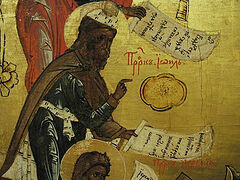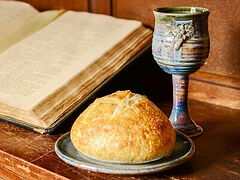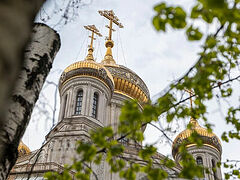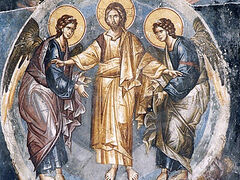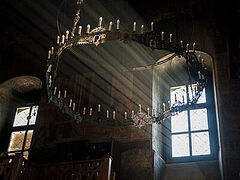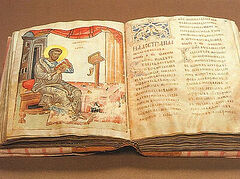Friends, we continue our talks on the book of the Acts of the Holy Apostles. We stopped at Acts 2:42.
The life of the first Christian community was noticeably different from ours. Of course, the root of Christian life is the Liturgy, prayer. This all remains. Take an acorn and an oak. Is an oak an acorn? Yes and no. By nature, yes, because an oak tree grows out of an acorn. But by external appearance, no, they are quite dissimilar. This is what the Church today is in comparison with the first Church. It’s one and the same Church, the same Holy Spirit lives within it, it has the same goals, the same tasks, but the appearance can be quite different, even radically so.
We’re going to read now about “Christian communism,” when people held everything in common. This is impossible to imagine now—simply impossible. This state of the Church didn’t last long. We’ll discuss this.
We’ll also read about what the faithful were doing at that time—it’s rather interesting. It’s generally a very important question: What should a believer do? What should he engage in? A man comes to Church—what should he do; how should he change his life?
I remember the first years of my life in the Church, when I started going to church. They told me: “Here’s a prayer book. Read the morning and evening rule.” I gradually mastered the morning and evening rule. Then: “What else?” “You have to go to church on Saturday evening and Sunday morning.” And I gradually got the hang of that. Then: “You have to go to confession.” I confessed. “Commune”—and I communed. “You have to go to church on feast days.” I started going on feast days. “You have to go on pilgrimage.” I went on pilgrimage. “You have to read this and that and that…” I read—I read a lot. And then? What next?
I remember bugging priests with this question. I’d say: “What else should I do?” The priest, who was my spiritual father, whom I tormented with constant questions, would hide from me. But I’d find him and ask: “What else should I do?” He’d say: “Do you go to church?” “Yes.” “Do you read the morning and evening prayers?” “I do.” “Well, pray during the day too.” I said: “How?” He answered: “Read some prayers—the Nicene Creed , for example. Do you want to? Do you know the Nicene Creed? Well, read it.” I read it. But I felt like it wasn’t enough for me. Reading prayers and going to church wasn’t enough.
And until I wound up at Fr. Andrei Tkachev’s parish, I basically didn’t know what to do. Fr. Andrei revealed Christianity from a different angle, when you actively participate in the life of the parish and work on some missionary projects. An active Christianity, a Christianity of service.
For example, you actively participate in the services. There were times where, for example, the service would be going on and Fr. Andrei himself would come out to the center of the church to read the Six Psalms. He saw me amongst the parishioners. “Come on, you read.” I got up to read. Or: “There aren’t many people on the kliros. Someone go sing.” And the parishioners went and sang and read. He developed some kind of activity in us not only outside the services, but in the services too. It was very interesting.
And so, what did Christians in the first Church do when there wasn’t yet such a developed cycle of services like we have today? When there weren’t yet developed evening and morning services every day? Before the typikon had been formulated? What did they do?
Let’s read from verse 42.
2:42 And they continued stedfastly in the Apostles’ doctrine and fellowship, and in breaking of bread, and in prayers.
There are several very important things here: the Apostles’ doctrine, fellowship, the breaking of bread, and prayer.
The doctrine of the Apostles—how do you imagine it? The Apostles gathered the people and taught. If we imagine the teaching of the Apostles today, how could we implement this practice? How can we learn from the Apostles? It could be some kind of educational projects, meeting with catechists, missionaries, priests—talking about the faith, deepening your knowledge about the faith. The Apostles were working with people who were already baptized.
According to the text, 3,000 people were baptized, and the Apostles then spoke with them. In any city where the Apostles founded a community, they baptized people, and then stayed and spoke with them for a long time. For example, the Apostle Paul says in his farewell conversation with the elders of Ephesus: By the space of three years I ceased not to warn every one night and day, and he adds: with tears (Acts 20:31). By the way, this is interesting. If you look through the epistles of the Apostle Paul, you can read them all in about five hours. But the Apostle taught these people for three years. Obviously he said more in person than he wrote.
When the community was established in Antioch, then Sts. Barnabas and Saul, the future Apostle Paul, gathered and taught the baptized people there for an entire year. A whole year they assembled themselves with the church, and taught much people. And the disciples were called Christians first in Antioch (Acts 11:26). That’s what the book of Acts says. This was a normal practice in the ancient Church: Either they studied for a long time before Baptism, or they were baptized and then enlightened, instructed, and catechized.
Ideally, the Christian tradition should be spread as follows: First, missionaries should come—people who talk about God, about Christ, about faith, about salvation with those who don’t know anything yet. “You know, God came to Earth, He was incarnate, He suffered for your sins, He Resurrected, and He created the Church,” and so on. Then after the missionaries come the catechists, who continue to deepen the knowledge of those who have already been baptized.
And the third step is immersion in Christian tradition. The third level is worship. Of course, worship is something a Christian should be involved in from the very beginning, but the deepening of spiritual experience, of Church life happens first of all in liturgical practice, in worship. Therefore, the practice of Christianization should take place in the following sequence: missionaries, catechists, and then priests (meaning worship). But it happens in other ways too. Sometimes people are baptized and then they’re enlightened. But these three components definitely must be there in some order or another.
The second thing the first Christians were engaged in was fellowship. The word “fellowship” has many interpretations. Some understand fellowship as human communication, that is, people communicated, spoke, got to know one another. The communities were still relatively small. But there’s another meaning of the word “fellowship.” St. John Chrysostom writes: “For by communing [fellowshipping], we not only make ourselves participants and co-communicants, but we unite ourselves with Christ. As the Body of Christ is united with Christ, so we unite ourselves with Him through this bread.”
The Holy Fathers sometimes called the Sacrament of Communion the Sacrament of “fellowship.” That is, the given word can be an indication of liturgical practice. And another meaning: fellowship as a fellowship of means—that is, alms.
What do you think, if these three semantic accents of the word are applied to our reality, what are we lacking today? What do we have, and what do we lack? Yes, mutual support. For some reason, this is much more common among Protestants than us. It’s even a shame. We do have a social ministry—the ministry of mercy is just beginning to develop in the Church, and it’s still quite weak.
Let’s say someone from the parish doesn’t show up for a few weeks. We don’t have someone who can call and ask, “What happened to you?” “I got sick.”
If something happens to a member of the community, the community should be aware of it, bring this person groceries, visit him, or help him in some other way. But most of the time, we’re all disconnected. Parishes don’t grow into communities. The parish means people come, they pray, they leave. But a community is a kind of organism in which cells communicate with each other, know each other, help each other, and somehow develop together. Where such a community has appeared, everyone immediately says: “Oh, how wonderful!” But it should be this way everywhere; this is the norm of Christian life.
There’s the Church of the Martyr Antipas of Perm, with its rector Fr. Andrei Schennikov. It’s one of the most tightly-knit young parishes in Moscow, and it’s seen as something unique. But that’s how it should be at every church. People shouldn’t run off after the service. They should talk together, go somewhere; they should have some common interests. I remember in our church in Kiev, where Fr. Andrei Tkachev was the rector, we would spend all day Sunday together, until evening, sometimes until late in the evening. We’d have coffee hour, then go somewhere, to some kind of show or a volunteer project—most important was just being together. Everyone is busy all week, and on Sunday you want to relax somehow, but not in a sinful way—and learn something at the same time. That’s how we tried to spend our Sundays.
We have Sunday Schools, but they’re not a panacea. As they say: “Like priest, like parish.” Very much here depends on a charismatic leader, on how the priest works, what kind of team he has around him, what the other priests in the parish are like.
Much also depends on the laity, on how active they are, because we also need to pester the clergy, to come up with some proposals, projects, activities. “Batiushka, let’s do this,” or, “I can do this and that—I have training as a catechist.” And even if Batiushka doesn’t help, at least he won’t interfere. He’ll bless it and say: “If you want, do it.” We need to develop lay activities. In the meantime, the problem remains. After all, there is something outside the Liturgy: fellowship, love, help, charity, friendship.
And they continued stedfastly in the Apostles’ doctrine and fellowship, and in breaking of bread, and in prayers (2:42). The breaking of bread—what do you think—what is this? Is it just food, or something more? Of course, we feel that this term refers to the Eucharist. Protopresbyter Nikolai Afanasiev writes about what the breaking of bread can mean and offers several hypotheses. One of them is that it’s just a meal. But for the Jews, a meal still had a religious character. It can also have a religious character for Christians: We pray before and after meals. Eating food has a mystical component. And in the ancient east, to eat with someone meant to have very close spiritual communication with that person. You didn’t eat with just anyone.
A friend told me a story. He and his wife got lost in some Arab country. It was a bit of an extreme situation. The desert, at nighttime, and there was some kind of pavilion. They sat down for a meal with the local Arabs. And for whatever reason, the Arabs didn’t quite get it—they thought they were their own kind. And they ate with them. Then the Arabs realized that these people were not of their religion. But since they’d already shared a meal with them, they continued to accept them as their own. That’s why the Apostle Paul says about a depraved man: With such an one no not to eat (1 Cor. 5:11). That’s the culture of that era. To eat together means to recognize someone as a friend and have close spiritual fellowship.
Today people read these words and think: “How can we fulfill this today: With such an one no not to eat? How am I supposed to know who’s sitting by me in the cafeteria? Am I really supposed to ask: ‘What do you believe? You’re not a heretic, are you? Come on, recite the Nicene Creed.’”
It sounds absurd, doesn’t it? We have a different culture today, including the culture of eating, a different attitude towards food. When you go to a café for breakfast, you smile at the Uzbek sitting across from you, you cross yourself, and you eat. We no longer take the Apostolic words so directly, because we have a different cultural context today.
Yes, it could be just a meal. But, again, for the ancient Christians, these agape meals were as a rule at night, and led into the Liturgy. The Christians ate, fellowshipped, preached, and then broke bread with special prayers, and later communed of the Body and Blood of Christ. Then they ate again. Therefore, the breaking of bread can mean the fraternal meal and the Eucharist together.
There’s a wonderful book by the historian New Martyr Pavel Sokolov, Agapes, or Meals of Love, in the Ancient Christian World. He explains what it could have been like.
And the fourth occupation of the ancient Christians was prayer. So, the first Christians abode in the Apostles’ doctrine, fellowship, and the breaking of bread. In essence, we’re talking about the whole Christian life. Prayer, the fellowship of means (charity), human communication, community life, catechism (education), teaching in the Church, Liturgy…
Some commentators look at these verses and say that it’s about the components of ancient worship: the teaching of the Apostles, fellowship, the breaking of bread, and prayer. That could be so. For example, if we look at the modern Liturgy—how many parts does it have? Classically, three: proskomedia, the Liturgy of the Catechumens, and the Liturgy of the Faithful. If we look at the first two parts, these are the doctrinal parts. There the Epistle and Gospel are read, and the homily should be preached. This is the Apostolic doctrine that Acts talks about.
When Fr. Andrei Tkachev was head of the Missionary Department of the Kiev Diocese, he’d gather the priests and tell them it was necessary to preach not only on the Gospel, but on the Epistle as well.
But let’s return to the text of Acts. This could be the model of ancient worship: teaching, fellowship, breaking of bread, and prayer.






